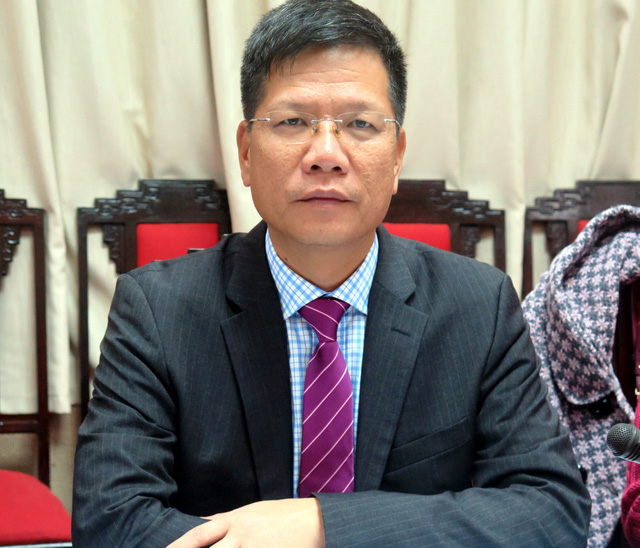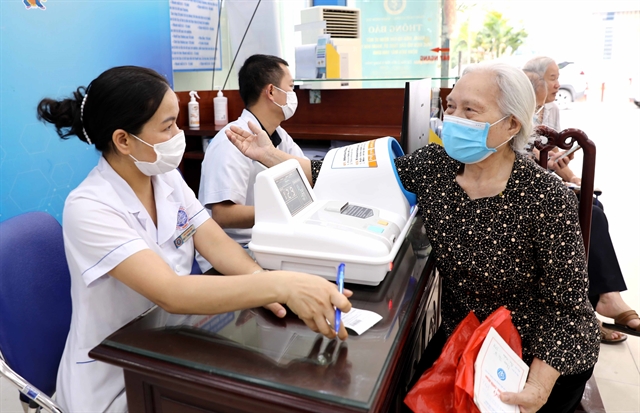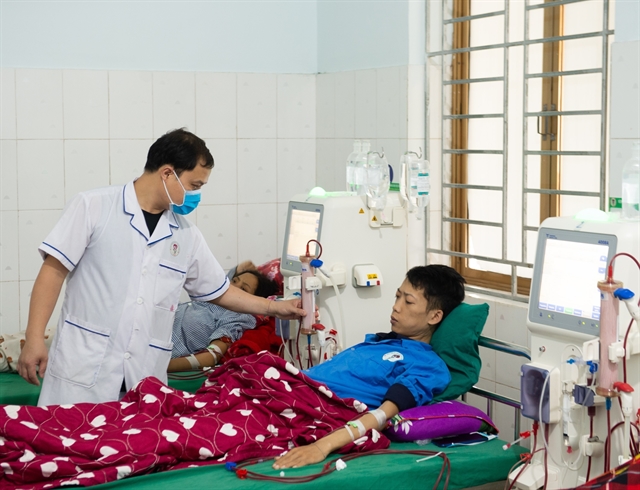 Society
Society

 |
| An elderly woman is examined at the Traditional Medicine Hospital in the northern province of Thái Bình.—VNA/VNS Photo Thế Duyệt |
HÀ NỘI — The number of health insurance participants has surged, benefits have expanded and healthcare quality has seen significant improvement after 15 years of implementing the Law on Health Insurance.
Since its inception in 2009, the law has seen involvement levels increase to over 93.307 million people, covering 93.35 per cent of the population, marking a 35.35 per cent rise since 2009.
Trần Thị Trang, head of the Health Insurance Department under the Ministry of Health told the Sức khỏe & Đời sống (Health & Life) newspaper that the coverage rate was 58 per cent in 2009.
In 2015, following amendments to the law, participation reached 68.5 million people, covering 74.9 per cent of the population.
By 2019, the number of participants increased to 85.7 million, achieving an 89.1 per cent coverage rate.
The number of healthcare visits, covered by the health insurance fund, has shown steady growth annually.
In 2010, there were 102 million visits, consisting of 93.7 million outpatient visits and 8.3 million inpatient treatments.
By 2015, the figure rose to 130.2 million visits, made up of 118.2 million outpatient visits and 12 million inpatient treatments.
In 2019, there were 184 million visits, with 166.9 million outpatient visits and 17.1 million inpatient treatments.
Due to the impact of COVID-19 from 2020 to 2022, healthcare visits decreased compared to the period from 2015 to 2019.
In 2020, there were 167.3 million visits, a decrease of 16.7 million from 2019.
By 2022, as the pandemic stabilised, visits increased to 150.4 million, a rise of 24 million from 2021.
As of June this year, the nationwide total of outpatient and inpatient visits, covered by the health insurance fund, was estimated at 89.552 million, up by more than 6.5 million (equal to 7.91 per cent) from the same period last year.
Trang said the rights of health insurance participants were guaranteed.
Overall, the scope of benefits for participants was quite comprehensive, including costs for medical examinations, blood transfusions, medical supplies, pharmaceuticals during medical visits,regular pre-natal check-ups and childbirth at healthcare facilities.
Additionally, the health insurance fund also covered transportation costs for patients from district to provincial and central-level hospitals for certain priority groups such as the poor, ethnic minorities, revolutionary contributors and children under six in emergency situations or when transferred for specialised medical treatment.
Annually, the health insurance fund also covered 87 per cent to 89 per cent of total healthcare expenses, while participants were responsible for co-payment only ranging from 11 per cent to 13 per cent.
Healthcare rights expanded
Trang said that healthcare rights under the health insurance policies were expanding to meet the healthcare needs of participants, adapting to changing disease patterns, advancements in medical science and technology, balancing the health insurance fund, participant payment capabilities and aiming to reduce out-of-pocket expenses for households.
The list of medicines (including new drugs and traditional medicines), medical supplies and healthcare services, covered by the health insurance fund were being continually adjusted to fit with the latest in medical and technical capacities of healthcare facilities, while ensuring the rights of cardholders and enhancing the technical expertise of healthcare facilities, she said.
Since the implementation of the law, nearly all public healthcare facilities with treatment functions had directly participated in health insurance contracts with social insurance agencies.
Nearly 10,000 commune/ward/town health stations also participated in health insurance through contracts managed by district hospitals or health centres assigned by provincial Departments of Health in the country.
She also added that administrative procedures, medical examination and treatment processes, payment procedures were significantly reformed to reduce inconvenience, facilitate patient access to healthcare services and create favourable conditions for organisations and agencies in implementing health insurance policies.
 |
| Dialysis patients are treated at Bắc Quang General Hospital, supported by the insurance health fund, in the northern mountainous province of Hà Giang. — VNA/VNS Photo Nam Thái |
Effective use
Since the official implementation of the Law on July 1, 2009, it has provided the highest legal basis to gradually achieve fairness in healthcare, implementing the sharing between the healthy and the sick, the wealthy and the poor and working-age individuals and children and the elderly.
To further enhance public engagement and mobilise health insurance across all levels, the ministry has chosen the theme for this year 'Effective use of the health insurance fund and improving the quality of health examination and treatment under grassroots healthcare.'
The ministry has issued a dispatch, requesting provincial People's Committees to direct the Department of Health to coordinate with social insurance offices and relevant agencies to submit proposals to offer education sessions for various groups participating in health insurance locally.
Key messages about health insurance focus on enhancing the quality of healthcare at grassroots healthcare facilities to increase access to health insurance for the public, using the health insurance fund efficiently, how health insurance means safeguarding your health and that participation gives people sustainable financial support during illness and disease.
Trang said that the ministry was currently drafting amendments to the Law on Health Insurance and several decrees to improve quality, ensure sufficient supply of medicines and medical equipment for examinations and treatment, reform medical examinations and treatment procedures and expand the scope of health insurance benefits. — VNS

.jpg)


